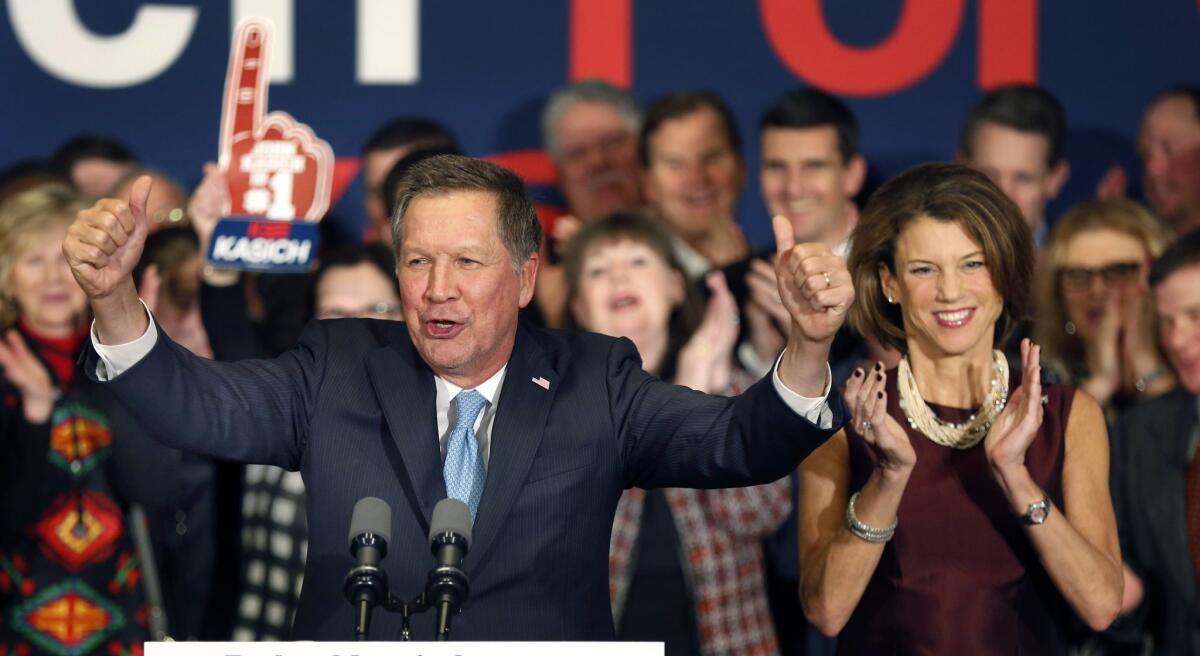Editorial: Trump wins N.H. while the GOP establishment churns

With his wife Karen at his side Republican presidential candidate Gov. John Kasich of Ohio cheers with supporters Tuesday in Concord, N.H., at his primary night rally.
- Share via
Before the New Hampshire primary, analysts predicted that Donald Trump would finish first on the Republican side and that Sen. Bernie Sanders would easily defeat former Secretary of State Hillary Clinton on the Democratic ballot. So it transpired, but there were also some heartening surprises in Tuesday’s results.
First the bad news: Donald Trump’s victory in New Hampshire, after his second-place finish in the Iowa caucuses, is an ominous development. The Republicans and “undeclared” independents who voted for Trump have entrusted their hopes to a demagogue with no experience in government who demonizes minorities, demeans women and promises to reinstitute waterboarding of suspected terrorists and “a hell of a lot worse.” That the voters were driven to support him by frustration with the unfulfilled promises of professional politicians is an explanation for their behavior, but not an excuse.
In more than one way, Kasich is the anti-Trump.
But if voters in the Republican primary fulfilled one prediction — a Trump victory — they confounded another: that they would reduce the race to a three-man contest comprising Trump, the hard-right Sen. Ted Cruz, who finished first in Iowa, and, as the sole representative of the so-called party “establishment,” the young and comparatively inexperienced Sen. Marco Rubio of Florida. That didn’t happen.
On Tuesday Rubio and Cruz finished well behind Ohio Gov. John Kasich, who scored a solid second-place finish. Like all of the Republican candidates, Kasich is a conservative and a critic of the Obama administration. But, like former Florida Gov. Jeb Bush and New Jersey Gov. Chris Christie, Kasich has experience as a chief executive and recognizes the need to compromise with lawmakers. He’s also called for a more humane version of government than most of his GOP rivals; for example, he has eloquently argued against uprooting immigrants living in this country illegally. In more than one way, Kasich is the anti-Trump.
On the Democratic side, Sanders’ impressive victory demonstrates both the appeal of his populist message and Clinton’s failure so far to galvanize many younger voters, a fact she acknowledged in her concession speech. It also reflects the fact that New Hampshire is more hospitable to Sanders than coming contests in other states — including South Carolina — will be. But, coming after he finished in a near-tie with Clinton in Iowa, Sanders’ victory in New Hampshire certifies him as a serious candidate with staying power and an anti-establishment message that resonates as powerfully for many Democrats as Trump’s does for disaffected Republicans. That dissatisfaction with the status quo undermines the advantage Clinton hopes to derive from her long experience in public life.
In his victory speech Sanders said he hoped that he and Clinton would engage in an “issue-oriented” campaign, an invitation that she is likely to welcome (especially if it includes a discussion of foreign policy, which isn’t Sanders’ strong suit). Democrats who once feared a premature coronation of Clinton can breathe easy (even if she can’t).
A longstanding, and valid, complaint about Iowa and New Hampshire is that the early contests in those states short-circuit the nomination process, eliminating candidates before they have an opportunity to make their case to a large and diverse electorate. No matter what the schedule is, early states will always exercise disproportionate influence. But this year at least Iowa and New Hampshire have clarified the Democratic and Republican contests without prematurely culling the field.
Follow the Opinion section on Twitter @latimesopinion and Facebook
More to Read
A cure for the common opinion
Get thought-provoking perspectives with our weekly newsletter.
You may occasionally receive promotional content from the Los Angeles Times.










